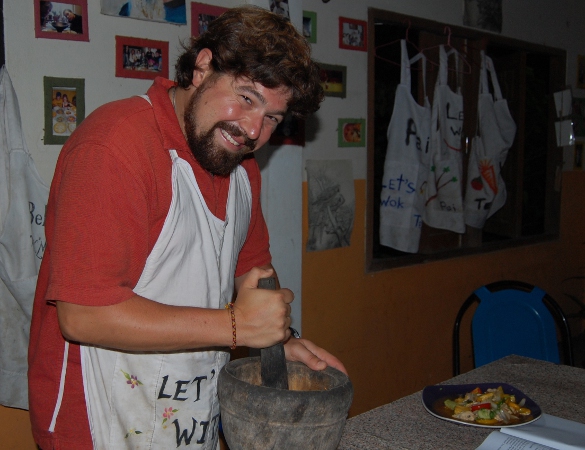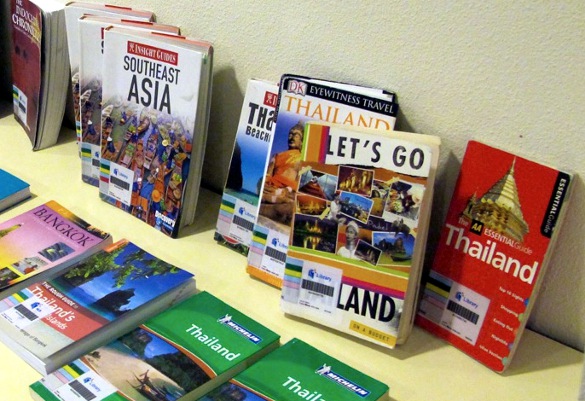Part of the fun of a RTW trip is being able to truly throw yourself into another culture. While immersing yourself in a culture is certainly possible on a short vacation, it can be difficult to get a true feel for another country and its people in a week. But a RTW trip affords you the time to really jump in head first and soak up everything you possibly can.
A popular activity among all travelers, not only RTW travelers, is taking classes while traveling. There are a plethora of opportunities out there, and if you are traveling for an extended period of time, it’s sometimes nice to have something scheduled for a week or two, getting back into a routine of sorts. Taking different classes also helps travelers get closer to a particular culture, typically learning a new skill or something new that he or she didn’t already know.
What Types of Classes are Available?

You’ll come across all different types of available opportunities while on the road. The beauty of RTW travel is that you don’t really have to book any of these in advance. It’s great to just turn up, talk to others to get their take on the situation, and then check out your options before making a decision.
Taking a language class is a very popular thing to do with RTW travelers, as it obviously helps with communication with the local people and can change the course of your time in a city or country, opening doors that wouldn’t otherwise be possible with the language barrier. Many travel to India, Southeast Asia, or other parts of the world to study yoga and maybe even get certified to teach it. More adventurous travelers might take Muy Thai classes in Thailand to learn a new sport, while foodies love to take cooking classes any time they get near a new cuisine. No matter what it is you are interested in learning more about, chances are there are classes that can help you out.
>>For more information on cooking classes, read Cooking Classes Abroad.
>>Read Budget Language Study: 5 Alternative Locations Around the World for more information about language classes.
>>If going to Hawaii, learn how to surf.
Booking Ahead or Waiting Until Arrival
Since you aren’t on any type of time crunch, waiting to book anything until you arrive in your destination is typically best. Sometimes that’s not possible, as popular classes book up in advance. If you are looking to get serious, like staying at an ashram in India for yoga classes or teacher certification, it might be necessary to research and book in advance, unless you are extremely flexible and don’t mind waiting a few weeks for something to open up. But for language, cooking, or other sport-type classes, it’s probably safe to just turn up and start asking around.
Where to Find Classes

The guide books are a great way to start, as they should have a list of reputable companies. But don’t stop there. The best tactic is to ask around. Fellow travelers, hostel workers, the local bartender – all are great sources for finding out the best place to take a class. First hand accounts and reviews are always better than a guidebook that could be a couple years out of date.
Another tactic is to turn to social media sites like Facebook and Twitter. Sending out a tweet could result in multiple suggestions within a matter of minutes. You also never know what you can find by simply walking around the city you’re in. We ended up taking an awesome Thai cooking class in Pai because we walked around and saw posters all over town. This particular class wasn’t mentioned in any guidebook or online anywhere, so we never would have known about it if we weren’t paying attention while wandering around town.
Make sure to shop around
After compiling a list of places to check out, make sure you go visit more than one. Don’t settle for the very first one, especially if you have never done this before. You have no idea what the next place will offer, so exploring your options is always best. Sometimes a particular person just doesn’t mesh with the most popular option in town, and personal feelings and instincts should be trusted.
Don’t always go with the most popular, and trust your instincts
Along the same vein, just because a place is big, advertises a lot, and is well known doesn’t mean it’s best. When we were looking for Thai cooking classes in Pai, there were several bigger schools that were certainly more popular than the one we ended up at. But after visiting several of the more popular schools, we didn’t get a good vibe.
The last place we decided to visit was a tiny little place in an alleyway. We saw signs around town, on poster board and written with black marker, for a class called Let’s Wok with T, and while they were so much less professional-looking than the other ones, we decided to at least check it out. We loved the teacher/owner, and we decided to take the class the next day, and it was one of the coolest experiences of the trip. He even took us out drinking to local bars and an all-Thai karaoke place after class. If we were only looking at the more popular places, we never would have even checked this place out.
The Importance of Choosing the Right School

We all had teachers we hated while in school. You know the ones – the teachers who were tenured and clearly didn’t care anymore, or the ones who had been teaching forever who were burned out and simply weren’t trying, or the ones who were brand new and didn’t have a clue, letting their students run roughshod all over them. When in school, we typically didn’t get a choice of which teacher we had.
Now is your chance to change that. By shopping around and talking to owners, administrators, and teachers, you can choose the one that works best for you. Take advantage of this opportunity – ask to speak to whoever will be teaching the class. Sit down and have a conversation, ask questions, and get to know a little about that person. Having a good rapport with the teacher and school is probably the best reason to choose that school, and it will have a major impact on your experience.
Taking classes and learning while traveling is a great part of a RTW trip. Taking that next step to really learn more about the culture you are in will help you not only have a more worthwhile time there, but also will create lasting memories and knowledge you can take back home with you. Every time you make masala chai, you can think back to that class you took in India. Every time you can chat with a Spanish speaker in his or her language, you can think back to that Spanish class you took in Guatemala.
We travel for the experiences and memories it will create, and taking a class while on the road will create new and lasting memories that you will remember forever.
Photo credits: 2
[more link=”https://www.bootsnall.com/rtw/travel-burnout.html”]Next: Travel Burnout: Is It Real? Will I Get It?[/more]